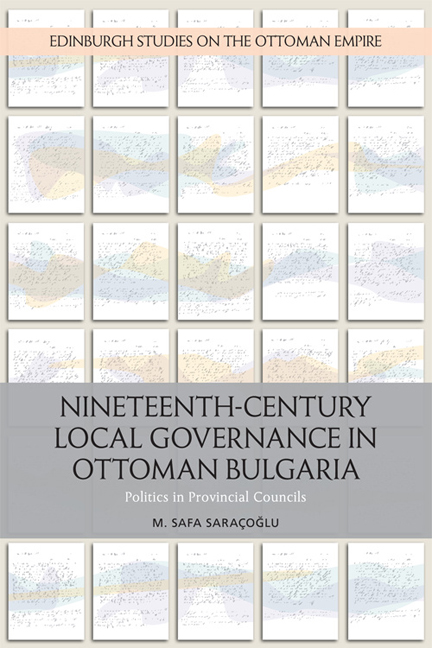Book contents
- Frontmatter
- Contents
- List of Maps, Figures and Tables
- Abbreviations
- Preface
- Map
- 1 Introduction
- 2 Contextualising the Nineteenth Century
- 3 Sitting Together: Local Councils and the Politics of Election in the County of Vidin
- 4 Once Inside the Chamber . . . Participation in the Politics of Local Administration
- 5 Writing Politics: Ottoman Governmentality and the Language of Reports
- 6 ‘Cattle Thieves’: Refugee Settlement, Ottoman Governmentality and Biopolitics
- 7 Conclusion
- Select Bibliography
- Index
2 - Contextualising the Nineteenth Century
Published online by Cambridge University Press: 24 April 2021
- Frontmatter
- Contents
- List of Maps, Figures and Tables
- Abbreviations
- Preface
- Map
- 1 Introduction
- 2 Contextualising the Nineteenth Century
- 3 Sitting Together: Local Councils and the Politics of Election in the County of Vidin
- 4 Once Inside the Chamber . . . Participation in the Politics of Local Administration
- 5 Writing Politics: Ottoman Governmentality and the Language of Reports
- 6 ‘Cattle Thieves’: Refugee Settlement, Ottoman Governmentality and Biopolitics
- 7 Conclusion
- Select Bibliography
- Index
Summary
Turkey was not a corpse, but a body paralyzed: it revived as soon as the enlightenment of the present generation recalled it to life, and the rare and interesting spectacle is presented of a country having totally altered its political condition in the short space of sixteen years, through the spirited and patriotic exertions of a few individuals, while that salutary change promises to be permanent, because the system will be continued by the pupils and imitators of those few eminent Statesmen, each of whom is surrounded by a chosen band of disciples brought up in their principles. (Porter and Larpent 1854: 10)
Such were the optimistic words of Sir George Larpent, who extended and published the memoir of his grandfather, Sir James Porter, in 1854, fifteen years after the beginning of the Tanzimat (the Reforms) period. Sir George Larpent recounts vividly the event that marks ‘the beginning’ of this era, the reading of the Gülhane imperial decree on 3 November 1839, soon after sixteen-year-old Sultan Abdülmecid came to power (1 July 1839). These words reflect what appears to be a prevalent way of interpreting these reforms: as an enlightened recall to life, a sudden reawakening of a seemingly paralysed body through the efforts of a few ‘spirited’ individuals. Such unsubstantial interpretations of the Tanzimat era as ‘Westerninspired reforms imposed from above’ in a declining empire prevent us from seeing a long process of transformation that began before the ‘long nineteenth century’ (1789–1922).
This chapter focuses on the long nineteenth century to understand the imperial framework of transformation behind the central topic of this book: the politics of local administration. The nineteenth-century Ottoman experience was not merely a series of Western-inspired reforms that unexpectedly transformed a stagnant empire. Instead, this was a period of socio-economic crisis that coincided with the culmination of a long-term transformation that began in the seventeenth century. Focusing on how people's access to the means of production transformed in the period leading up to and during the nineteenth century, and tracing the impact of this change on the fiscal and bureaucratic practices of Ottoman governance provides a better framework for examining the emergence of the liberal-capitalist social formation in the Ottoman Empire.
- Type
- Chapter
- Information
- Nineteenth Century Local Governance in Ottoman BulgariaPolitics in Provincial Councils, pp. 14 - 43Publisher: Edinburgh University PressPrint publication year: 2018



